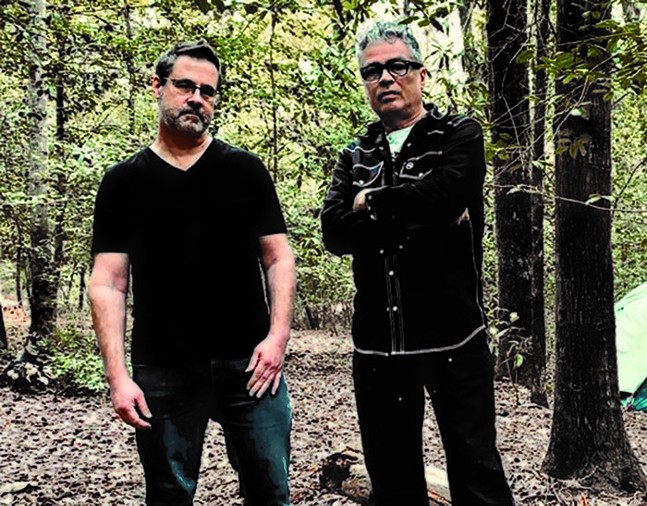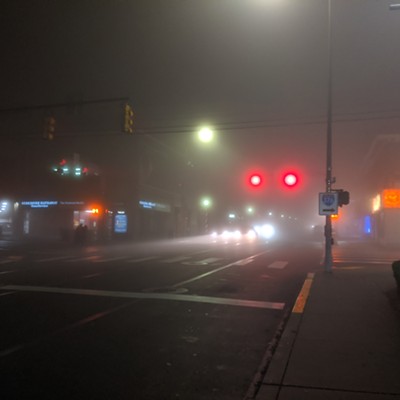Special Messages singer remembers hometown environmental tragedy with “Donora” song and music video
Spencer James, the singer/songwriter of post-alt band Special Messages, grew up in Donora, Pa. in the 1970s before his family relocated to Maine, and was intrigued by the history of the town. He did some research and spoke to the directors of the Donora Smog Museum, a small outfit dedicated to the 1948 industrial-caused disaster that impacted thousands of residents in and around the former mill town, located just an hour south of Pittsburgh.
James, who now resides in North Carolina, then wrote the lyrics to "Donora," combining it with music by bandmate Craig Elliot. The song is now part of Scribbles and Splashes, the new LP from Special Messages. The band’s Facebook page defines their genre as “post-alt chill punk,” their sound a mix of alt-rock and alt-country.
Scribbles and Splashes, available now on most music streaming music platforms, is the duo’s first album, and “Donora” fits in perfectly with the smooth, nostalgic rock sound of the 13-track record.
James sings about the current state of Donora with “And the stores are open just for show / But there’s nobody in them, no one I know." Although Donora may seem desolate, the lyrics, “This is my hometown, this is where I’m from,” conveys a sense of pride.
The music video features footage and photos from Donora's past and present. Low-tempo music and sad lyrics accompany archival images of old-school Kennywood and a 1950s home movie of I Dream of Jeannie actress Barbara Eden when she visited the Donora Frontier Days festival.
“Through the process of creating the video and talking with current residents, the experience became transformative," says James. "I realized that there was a certain amount of ‘moving on’ that I needed to do. Contributing to a better future is much more productive than pining away for the past.”
The video and song release coincides with the 73rd anniversary of the deadly Donora smog incident, when a temperature inversion trapped toxic smoke from the American Steel and Wire Co., Zinc Works, and coal furnaces in the valley. The smog, which lasted from Oct. 27 to Oct. 31, 1948, killed 20 people over the course of those days, both from Donora and the neighboring town of Webster, just across the Monongahela River. It darkened the town for the entire five days, and left thousands suffering from respiratory illnesses. Hospitals were overflowing, and people were left unable to breathe.
The smog eventually dissolved after the mills were ordered to shut down, despite initial refusal from the people who ran it. Additionally, on the last day, a storm helped sweep much of the pollution away.
Despite being dubbed by The New York Times as America’s worst air pollution disaster, the Donora smog event did little to immediately change policy. American Steel and Wire was hit with lawsuits stating that they were responsible for the deaths, which they settled, and the company continued running the facility because of how much of the town worked there. It wasn’t until 1952, when a similar smog event occurred in London, England, that the U.S. finally changed its laws concerning air pollution. The mills then closed due to worker strikes and environmental legislation.
Both Donora and London were important factors in lawmakers finally recognizing air pollution as a public health issue, leading to the 1955 Air Pollution Control Act and subsequent environmental legislation being passed.
Though James left Donora in 1979, he returned to his hometown a few years ago to help put his last living Donora-based relative into a personal care home. He says that relative, his aunt Dorothy Marinkovich, had lived in Donora her entire life and worked in Pittsburgh, at one point selling suits to star Pirates player Willie Stargell, and later serving as a clerk and translator at the Yugoslavian consulate.
James says he hopes the song and video will make people see the beauty and soul of the town he grew up in.
“Donora is geographically well placed for businesses to set up shop on the river and thrive,” he says. “The valley is so naturally beautiful — my hope is that more companies will take notice and move in.”
However, he also wants people to see beyond Donora's tragic past or its potential future.
“Admittedly, the song itself is the ‘usual’ sad story of an ex-mill town, but along the way, I realized that it was never the amount of stores, industries, or the population that made Donora great, but more about the heart and soul of the people that defined it as a wonderful community," James says. "I will forever cherish the memories.”
Special Messages specialmesages.org
James, who now resides in North Carolina, then wrote the lyrics to "Donora," combining it with music by bandmate Craig Elliot. The song is now part of Scribbles and Splashes, the new LP from Special Messages. The band’s Facebook page defines their genre as “post-alt chill punk,” their sound a mix of alt-rock and alt-country.
Scribbles and Splashes, available now on most music streaming music platforms, is the duo’s first album, and “Donora” fits in perfectly with the smooth, nostalgic rock sound of the 13-track record.
James sings about the current state of Donora with “And the stores are open just for show / But there’s nobody in them, no one I know." Although Donora may seem desolate, the lyrics, “This is my hometown, this is where I’m from,” conveys a sense of pride.
The music video features footage and photos from Donora's past and present. Low-tempo music and sad lyrics accompany archival images of old-school Kennywood and a 1950s home movie of I Dream of Jeannie actress Barbara Eden when she visited the Donora Frontier Days festival.
“Through the process of creating the video and talking with current residents, the experience became transformative," says James. "I realized that there was a certain amount of ‘moving on’ that I needed to do. Contributing to a better future is much more productive than pining away for the past.”
The video and song release coincides with the 73rd anniversary of the deadly Donora smog incident, when a temperature inversion trapped toxic smoke from the American Steel and Wire Co., Zinc Works, and coal furnaces in the valley. The smog, which lasted from Oct. 27 to Oct. 31, 1948, killed 20 people over the course of those days, both from Donora and the neighboring town of Webster, just across the Monongahela River. It darkened the town for the entire five days, and left thousands suffering from respiratory illnesses. Hospitals were overflowing, and people were left unable to breathe.
The smog eventually dissolved after the mills were ordered to shut down, despite initial refusal from the people who ran it. Additionally, on the last day, a storm helped sweep much of the pollution away.
Despite being dubbed by The New York Times as America’s worst air pollution disaster, the Donora smog event did little to immediately change policy. American Steel and Wire was hit with lawsuits stating that they were responsible for the deaths, which they settled, and the company continued running the facility because of how much of the town worked there. It wasn’t until 1952, when a similar smog event occurred in London, England, that the U.S. finally changed its laws concerning air pollution. The mills then closed due to worker strikes and environmental legislation.
Both Donora and London were important factors in lawmakers finally recognizing air pollution as a public health issue, leading to the 1955 Air Pollution Control Act and subsequent environmental legislation being passed.
Though James left Donora in 1979, he returned to his hometown a few years ago to help put his last living Donora-based relative into a personal care home. He says that relative, his aunt Dorothy Marinkovich, had lived in Donora her entire life and worked in Pittsburgh, at one point selling suits to star Pirates player Willie Stargell, and later serving as a clerk and translator at the Yugoslavian consulate.
James says he hopes the song and video will make people see the beauty and soul of the town he grew up in.
“Donora is geographically well placed for businesses to set up shop on the river and thrive,” he says. “The valley is so naturally beautiful — my hope is that more companies will take notice and move in.”
However, he also wants people to see beyond Donora's tragic past or its potential future.
“Admittedly, the song itself is the ‘usual’ sad story of an ex-mill town, but along the way, I realized that it was never the amount of stores, industries, or the population that made Donora great, but more about the heart and soul of the people that defined it as a wonderful community," James says. "I will forever cherish the memories.”
Special Messages specialmesages.org

















